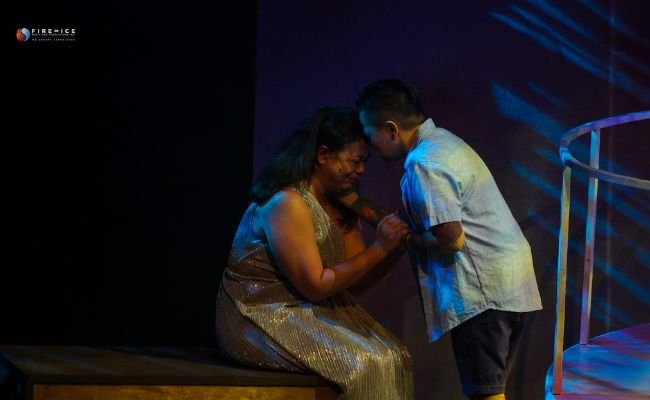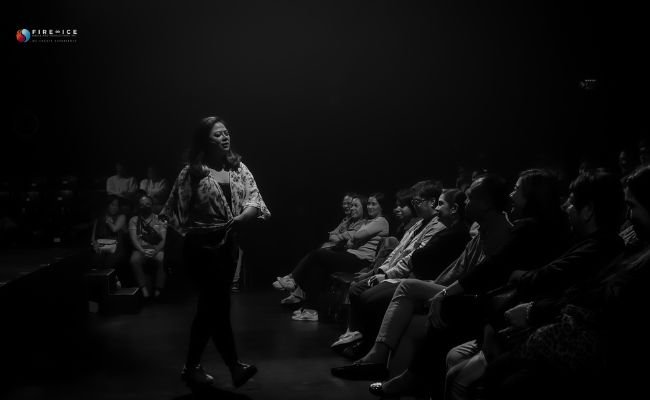Choosing: A Stage Play and A Space For Hard Conversations

Just in time for the celebration of Pride Month, Choosing took the stage, telling a beautiful story and creating a space for conversations that society often avoids. Produced by Fire and Ice Entertainment—a creative collaboration between real-life couple and creative forces, Ice Seguerra and Liza Diño–Seguerra—Choosing is a stage play that conveys powerful statements on the idea of love and identity through its main characters Mitch and Stella, born out of the personal journeys and narratives of the power couple.
This stage play offers a safe space as its plot unfolds, leading to a liberating clarity on questions that people either fear or dismiss in their everyday lives. “At the end of the day, our goal was clarity. If our story could help people better understand what love looks like in the middle of change, then we had to be honest, not just for us, but for everyone who might see themselves in us,” Liza shares, revealing their objective while traversing the creative process in writing Choosing.

Meanwhile, aside from being a stage play that sparks conversation on compelling topics such as love and identity, Choosing is also a product of creative synergy. Internationally renowned theatre artist Dr. Anton Juan brings Liza’s words to life through his direction while real-life partners Liza and Ice breathe life to the characters of Choosing, telling a story, sharing their truth, and advancing the queer community.
Choosing Through the Lenses of Ice and Liza
While Choosing delves into the fictional story of Mitch and Stella as they explore themselves along the terrains of life, it also gives a glimpse of the true-to-life experiences and journey of Liza and Ice, from whom the characters were born. “The germ of the play started with a question: As Ice and Liza, how do we deal with this life-changing decision of transition? From there, we just allowed the story to take us to all the unknowns,” Liza narrates, unveiling the creative process in balancing fiction and their truth as partners.
The creation of this story seemed like an introspective experience for both Ice and Liza as they discover more of themselves as individuals and partners, navigating themselves in the complex reality of life. “I didn’t go into this project with a clear plan of what to reveal. The process felt more like emotional excavation,” the writer of Choosing shares. “I started giving the hard questions I was too afraid to ask in real life to Stella. And then Mitch—Ice—would respond, often in ways that surprised even me,” Liza added, sharing how the process helped them build depths among the characters.
Meanwhile, Ice recognizes how Mitch and Stella mirror their truth as a real-life couple, who continue to go through similar situations, together maneuvering their lives through its obstacles. “They’re (Mitch and Stella) definitely rooted in us. We had our fears, our fights, our faith in each other. But Mitch and Stella are also heightened versions. They carry the weight of all the choices we’ve had to make, both as partners and as individuals navigating identity, love, and expectations,” Ice shares. On the other hand, he also sees a point where Ice-Liza and Mitch-Stella diverge.
“The biggest divergence is that their story has to be resolved in 90 minutes. In real life, we’re still figuring things out. And that’s okay.”
—Ice Seguerra

“In the search for answers, you begin excavating everything: past trauma, unspoken fears, old wounds, and even the beautiful moments that remind you why you’re still choosing each other.”
—Liza Diño-Seguerra
“Some moments were too raw, some were too specific, and others held a universal weight we knew needed to be told. It was never about spilling everything, but rather sharing just enough to connect deeply.”
—Ice Seguerra
Their personal stories and narratives added depth and a sense of relatability to the characters of Stella and Mitch, allowing not only the real-life couple but also the audience to be connected to the story. Choosing touches the lives of the people who witness its story unfold, as it leads them to clarity on emotions and experiences deemed complicated. “The parts of our personal story that ended up onstage came out organically. We let the story unfold, and when something felt necessary—when it helped clarify a feeling or deepen the truth of a scene—we allowed it in,” Liza reveals, emphasizing the essence of their intention on creating the story in the smooth fusion of fiction and their truth as a couple through the conversations often chosen to not talk about. Ice also revealed how their truth helped them navigate the story and create a connection to a universal experience of many queer individuals.
“We started with the truth, our truth. But we also knew that our story, while personal, represents the emotional journey of other LGBTQIA+ people. The decision on what to reveal came down to asking: “Will this help someone feel seen?”
—Ice Seguerra
“If our story could help people better understand what love looks like in the middle of change, then we had to be honest, not just for us, but for everyone who might see themselves in us.”
—Liza Diño-Seguerra
Hard Conversations Matter
“I hope Choosing creates space for the hard conversations—the ones we tend to avoid, even in the most loving relationships,” Liza answered when asked about the discussions that their stage play hopes to spark, specifically on love’s persistence through change and transition, uncertainties, and grief. Holding on to these hopes, Choosing became more than just a stage play for people to enjoy, but created a safe space where the conversations that are perceived as hard to discuss matter and are tackled.

Following a story of queer love, the writer of Choosing also hopes for its compelling story—intensified even more by its powerful production—allows the audience to understand and reshape their perspective on the affection between queer individuals along with other sigificant conversations such as the concepts of trauma, gender dysphoria, consent, even sexual abuse.
“I hope people walk away seeing that queer love is just… love. It’s layered, flawed, evolving. It’s not just a headline or a celebration during Pride Month. It deserves to be seen in its full complexity—as something that takes courage, vulnerability, and, most of all, choice.”
—Liza Diño-Seguerra
Taking it further, their team recognizes that while they aim to openly tackle such realities, often taboo, they must build a safe space for everyone, including those in the production and their audiences. “These are topics that are often too fragile or uncomfortable to talk about—and even more rarely explored on stage in ways that don’t feel preachy or heavy-handed,” Liza shares, emphasizing their commitment to tell the stories with care, softness, and truth.
And they did not fail. Liza shared “one of the meaningful things” that happened ever since they first staged Choosing: a member of the audience uttered, “That happened to me,” as the story revealed a compelling scene on consent. Such an encounter fueled Choosing to not only take the stage in the name of art, but also become an avenue that mirrors, celebrates, embraces, and protects the reality of many individuals who find themselves in the stories and journey of Mitch and Stella. This leaves Liza hopeful and positive about the power of Choosing to spark change, while Ice hopes to touch the lives of the people beyond the corners of the theatre where they stage Choosing.
“I hope this play starts those conversations. The quiet ones. The necessary ones. The ones that bring us back to our humanity.”
—Liza Diño-Seguerra
“If someone leaves the theater feeling braver, more understood, or more curious, then we’ve done our job.“
—Ice Seguerra
Chud has always believed that to write is to live a human life as it is meant to be free and is destined to set others free -the very essence of humanity. He sees writing as a tool to bring the world closer to people. It is a challenge that he takes on in every story, poem, article and film he writes.






